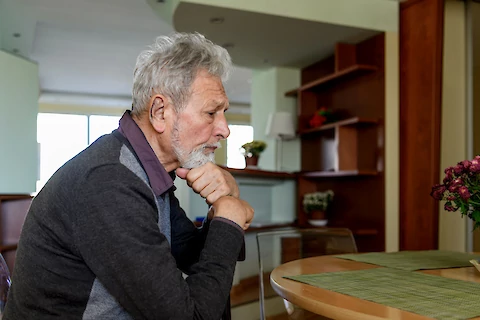
Depression is a common mental health issue that affects millions of people worldwide, and seniors are no exception. As a caregiver or family member, understanding depression in seniors is crucial to ensure their well-being and provide the best care. In this blog post, courtesy of Senior Helpers Vancouver, we'll delve into the symptoms, risk factors, and potential triggers of depression in seniors.
Symptoms of Depression in Seniors
Depression can manifest through various emotional, physical, and cognitive symptoms in seniors. Emotionally, seniors may experience persistent sadness, hopelessness, irritability, or agitation. They might lose interest in activities they once enjoyed and face difficulty experiencing pleasure.
Physically, depression can affect seniors' appetite and weight. Some may experience a decrease, while others may overeat. Sleep disturbances are common, like insomnia or oversleeping. Seniors may feel fatigued, lacking the energy to carry out daily tasks.
Cognitively, seniors with depression may struggle with concentration and decision-making. Memory problems may become more apparent, and in severe cases, they might have suicidal thoughts or attempts.
Risk Factors for Depression in Seniors
Various factors may increase the risk of depression in seniors, including biological, psychological, social, and environmental factors. A family history of depression or an imbalance of chemicals in the brain may predispose some seniors to this condition.
Psychologically, personality traits like pessimism or low self-esteem may make seniors more vulnerable to depression. Those with a previous history of depression are also at a higher risk. Socially, a lack of support, isolation, and loneliness can contribute to the development of depression.
Potential Triggers for Depression in Seniors
In understanding depression in seniors, it helps to look into major life changes, such as retirement or the loss of a loved one. Such events may trigger depression in the elderly. Health-related issues, like chronic pain, illness, or cognitive decline, can also contribute to the onset of depression. Social isolation due to living alone, limited mobility, or lack of transportation options may exacerbate feelings of loneliness and depression.
Tools and Suggestions for Helping Seniors Manage Their Mental Health
Encourage open communication and offer emotional support to your senior loved one. Let them know that you are there to listen and provide a safe space for them to express their feelings.
Promote regular exercise and a healthy diet, as these can have a significant impact on mental health. Gentle exercises, such as walking or yoga, can alleviate depressive symptoms by releasing mood-enhancing endorphins. Do consult with your healthcare provider before embarking on a new exercise routine. A balanced and nutritious diet can also improve overall well-being.
Foster social connections by encouraging seniors to engage in activities and interact with others. This can help prevent feelings of isolation and loneliness. Assist your senior loved one in managing medications and healthcare appointments to ensure they receive appropriate treatment for health issues that may contribute to depression.
Monitor your loved one for warning signs of depression and intervene when necessary. Early intervention can make a significant difference in their mental health journey.
Seeking Professional Help for Depression in Seniors
Early intervention and treatment are of utmost importance when addressing depression in seniors. Mental health professionals, such as psychologists or psychiatrists, can provide appropriate support and guidance tailored to the individual's needs. Research mental health providers in your area, and consider factors such as experience working with seniors and treatment approaches when selecting the right provider for your loved one.
Discover Personalized Senior Care
Understanding depression in seniors helps caregivers and family members to provide the best possible support. Being proactive in addressing mental health concerns can help our senior loved ones maintain their well-being and enjoy their golden years. If you or a loved one needs premium senior care in the Vancouver, Longview, Camas, Kelso, Battle Ground, or Chehalis areas, contact Senior Helpers Vancouver for compassionate and professional care.